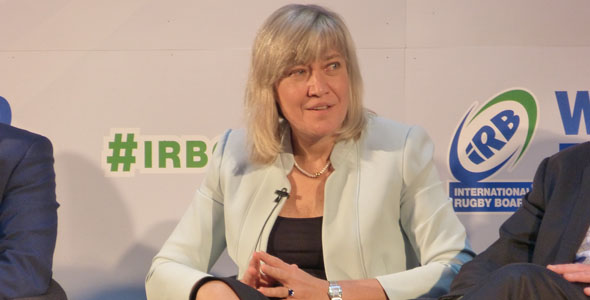IRB Conference 2014: IRB Transform into World Rugby
November 19, 2014
IRB Conference Day Two Round-up
The International Rugby Board entered a new era on Tuesday as it officially became World Rugby.
Brett Gosper (pictured left), CEO of the organisation, unveiled the new logo to go with the new name at the close of the 2014 IRB conference.
The rebranding was part of World Rugby’s plans to help grow the sport worldwide and make it easier to enter new territories.
“The World Rugby name will make our marketing and communications’ dollars travel a lot further and will also align the organisation’s objectives, and ” Gosper said.
“The brand reflects the journey we have been on, where we are now, and also prepares us for the journey ahead.”
World Rugby Chairman Bernard Lapasset said: “Global Rugby participation has boomed by more than two million to 6.6 million players over the past four years, driven by the commercial success of Rugby World Cup, World Rugby’s development strategies and record investment, strong and vibrant Unions and Rugby’s re-inclusion in the Olympic Games.”
“Today’s launch embodies our mission statement to grow the global Rugby family beyond our traditional family and fan base and reflects the federation’s evolution from Rugby regulator to Rugby inspirer.”
The rebrand will have no impact on the Rugby World Cup 2015 branding or positioning, which will remain as it is throughout the event.
Reedie Olympic hosting warning to Doha
International Olympic Committee vice president Sir Craig Reedie has warned Qatar that they would need to fulfil the values of the Olympic charter, would they to ever host the Olympics.
Reedie (pictred below) was speaking at the IRB conference in London on Tuesday just moments after news emerged that Doha had been chosen as the host city for the 2019 IAAF World Athletics Championships.

The Scot admitted that the lure of the “financial strength” of the gulf nation was hard to resist for some sports. But he stressed issues such as human rights abuses were not something that the IOC took lightly.
“There is a modest change in the Olympic charter which talks about discrimination and they would have to fit the Olympic charter before they were awarded an Olympic Games,” he said.
“In many ways we have dealt with that issue.
“Whether sport in general takes a different view, I can’t comment on. Some sports see the attraction of the financial strength of Qatar and certainly after their last Olympic bid which didn’t get into the second round, they seem to me to be concentrating pretty much thereafter on individual sports.
“Their first success was an individual sport but quite a big one and they’ve done tennis, they’re doing short-course swimming, handball and their now doing world athletics – all individual sports.”
Doha has bid for the Olympics before, both for the 2016 edition and the 2020 event. However they failed to make it to the final candidate city shortlist on both occasions.
Reedie, president of the World Anti-Doping Agency, also suggested that the IOC would need to be assured that venues at the Games would easily be sold-out in the small gulf nation.
“There is a size issue in Qatar that they are aware of,” he added.
Changes to the Olympic charter will be discussed by the IOC next month when they meet to review the Agenda 2020 proposals, released today.
Rugby World Cup to bring £1billion to UK economy
England/Great Britain should continue to bid to host large scale sporting events for the good of the economy, according to England 2015 ceo Debbie Jevans.

Jevans (pictured above) made her comments amid the announcement of a study which suggests that the Rugby World Cup next year will contribute a total output of around £2.2 billion to the country’s economy.
The study undertaken by EY on behalf of the Organising Committee for Rugby World Cup 2015, estimates that this will translate into a contribution of £982 million to the national GDP.
“The decision to bid for a big event is still relevant because the impact of hosting a big event tangible and intangible. The impact after the Olympic Games and that feel-good factor is really important to us and also the impact economically on the whole country.
“We’re expecting a £2.2billion impact, almost £1million of which will contribute to the national GDP and that’s really important. Jobs created will be around 40,000 and that’s very important. For us about rugby about what it can do to galvanise nation. Along with an increase in participation, there’s been an increase in rugby clubs, rugby in schools; there are many benefits.”
{jcomments on}



